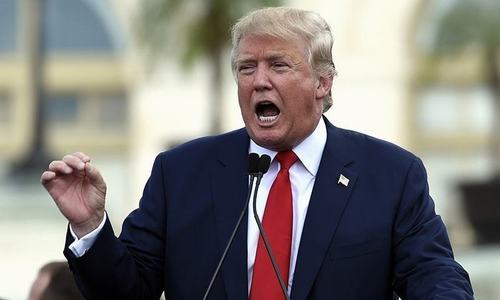US President Donald Trump's administration on Thursday unveiled a sweeping new immigration plan to Congress that offers 1.8 million young unauthorized immigrants known as “Dreamers” a path to citizenship over 10-12 years.
In a comprehensive reform that will be formally presented next week, Trump has also asked Congress to eliminate the popular “green card lottery” program and severely restrict family immigration, steps analysts say could cut in half the more than one million foreign-born people moving to the country annually.
And in the name of halting illegal immigration, he has also demanded Congress budget $25 billion for a “trust fund” for constructing a wall on the US-Mexico border — a major plank of Trump's White House campaign.
“The Department of Homeland Security must have the tools to deter illegal immigrants; the ability to remove individuals who illegally enter the United States, and the vital authorities necessary to protect national security,” a senior White House official told journalists.
The White House's offer of a path to citizenship for the Dreamers was much wider than expected. Earlier it had suggested it was only open to granting citizenship to the 690,000 young immigrants registered under the Deferred Action for Childhood Arrivals, or DACA, program.
But in exchange, Trump was asking Congress to make future legal immigration more difficult — and to shore up the Homeland Security Department's toolbox and funding to crack down on the overall population of unauthorized immigrants, estimated at some 11 million, including Dreamers.
That could make the plan difficult to get past Democrats, no matter how strong they want the Dreamers reform.
“There is no public policy justification for cutting legal immigration in half. None,” said Democratic Senator Brian Schatz on Twitter.
Sharp turn in immigration policy
The plan represents a sharp shift in US immigration policies.
Trump promised during his 2016 presidential campaign a tough crackdown on illegal immigration, but has extended this to narrowing the doors for legal immigrants and refugees.
The end of the lottery system — which was introduced in 1990 to diversify the origins of new immigrants — was expected and has support from some Democrats. Trump has argued the program has allowed people into the country who have supported Islamic extremists.
“This program is riddled with fraud and abuse and does not serve the national interest,” the White House said in a summary Thursday.
Trump however at least momentarily undermined his push against the lottery when, in immigration bill negotiations with lawmakers in early January, he complained about immigrants from what he reportedly dubbed “shithole” nations like Haiti, El Salvador and countries in Africa, sparking widespread outrage.
Trump has also argued for ending “chain” migration, the practice of allowing the extended family members of people who already have US citizenship to immigrate.
Thursday's proposal said that to “protect the nuclear family,” family immigration would be only permitted for spouses and minor children.
Battle in Congress likely
The White House plan immediately provoked the ire of Democrats, who made clear they would likely fight to water down the changes in negotiations in coming weeks.
Pro-immigration groups said it would reduce overall immigration by half, and was aimed at bringing more Caucasians into the country.
“$25 billion as ransom for Dreamers with cuts to legal immigration and increases to deportations doesn't pass the laugh test,” said Democratic Representative Luis Gutierrez.
“The White House released a hateful, xenophobic immigration proposal that would slash legal immigration to levels not seen since the racial quotas of the 1920s,” said Lorella Praeli, director of immigration policy at the American Civil Liberties Union.
But Republican leaders in Congress voiced solid support: Senate majority leader Mitch McConnell said the White House proposal was a “framework” for crafting a final immigration deal.
Republican Senator Tom Cotton, a hardline conservative, called Trump's framework “generous and humane, while also being responsible.”
However, some conservatives were angered by the sweeping offer to Dreamers, which they say constitutes an amnesty that rewards law-breakers and sets a bad precedent for other undocumented immigrants.
“Any proposal that expands the amnesty-eligible population risks opening Pandora's box,” said Michael Needham, chief executive of the right-wing lobby Heritage Action.
“That should be a non-starter,” he said.












































